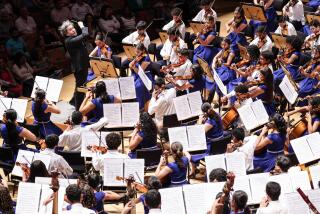A Fresh Take on Tchaikovsky by Youth Symphony
F rom the Mehli Mehta era onward, Tchaikovsky’s Symphony No. 4 has been a signature display piece for the American Youth Symphony--always a chance for young musicians to vent some exuberance, always a hit with the audience. But the Fourth is also a challenge for some of us who have long since gotten over the novelties of hearing the pizzicato Scherzo, the sudden full-orchestra blast that opens the finale, the references back to earlier tunes. How do you make it sound fresh again?
Alexander Treger, now in his third season as AYS music director, doesn’t pretend to have all the answers. But he came up with some good ones Sunday night as part of an all-Tchaikovsky AYS gala benefit concert at the Dorothy Chandler Pavilion.
Treger established the rhythm in the first movement right away and kept it going throughout, swaying to and fro, aiming toward his destination without slowing down to indulge in distracting sightseeing. The middle section of the second movement rumbled by in a swift, unified torrent; the young musicians stayed with the daringly fast tempo of the Scherzo; and Treger astutely welded the sections of the finale together, smoothing over the gaps that tempt audiences to applaud in mid-movement.
At all times, you could hear the results of careful preparation, particularly in the silken phrasings of the cello section. And the piece still made a gratifyingly exuberant noise. Following a raucous rendition of the Polonaise from “Eugene Onegin” at the outset, 26-year-old Lithuanian-born violinist Julian Rachlin displayed his often languorous, uncut conception of the Violin Concerto, basically unchanged from when he made his Sony recording of the work at 19. Often, it was at odds with Treger’s more vigorous, straightforward ideas, and Rachlin’s playing was not immaculate. But Rachlin reached into his encore bag and pulled out a gem, a sizzling, totally concentrated performance of the Ballade from Ysaye’s Sonata No. 3.
More to Read
The biggest entertainment stories
Get our big stories about Hollywood, film, television, music, arts, culture and more right in your inbox as soon as they publish.
You may occasionally receive promotional content from the Los Angeles Times.










